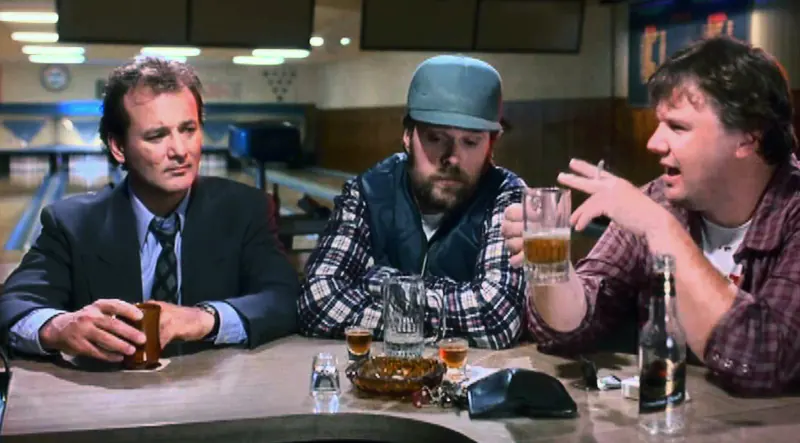Groundhog Day: What Would You Do If...?
Bill Murray in Bar with Locals
Today, Groundhog Day is cool. Bill Murray is super kewl and we bow humbly to Wes Anderson's uber-coolness. For me, living in the heart of Hollywood-fearing Europe, once things were very different. Whether misguided by the notorious francophile blockbuster-phobia or the delusion of our intelligentsia, whatever came out of Hollywood and scored big bucks was to be avoided at all cost. Needless to say I was in for a big treat when I finally discovered Groundhog Day. Over the years, it has climbed into my top ten favourite movies of all time.
DANNY RUBIN AND HAROLD RAMIS
Comedy guru Steve Kaplan calls this is a perfect film and I must agree. It is flawless. Interestingly, after reading the original (and very different) draft by screenwriter Danny Rubin, I believe that script would have made a perfect film, too, although it is wildly different in many ways. I recommend you read “How To Write Groundhog Day,” which contains this original screenplay and not only offers a brilliant insight in Hollywood screenwriting, it is also a page turner in its own right. What it taught me is that co-writer and director Harold Ramis is nothing short of a genius.
FROM INDIE COMEDY TO HERO'S JOURNEY BLOCKBUSTER
Groundhog Day is a perfect movie with a perfect hero's journey showing the transformation of Phil Connors from an ego-centric jerk to a mensch. This structure was not present in the original script and Ramis deserves the credit for it. Although Danny Rubin makes it sound like the final film follows the Hollywood template formulaically, I don't fully agree. Ramis was smart enough to preserve the strengths of the original script and not discard what worked, even where it didn't slavishly follow the standard structure. One point where the film diverts from the standard hero's journey is the point when we enter the geographical Special World. Typically this is the end of Act One but here it is at the inciting incident/Call To Adventure. Once we (the audience) realise Phil is stuck in the Groundhog Day, he remains in denial - 'Refusing the Call' - until we reach our Movie Moment.

THE MOMENT: SUMS IT UP FOR ME
Phil is chilling at the bar with a few locals and after a few too many, he asks “What would you do if you were stuck in one place and every day was exactly the same and nothing that you did mattered?” The reply sets up the movie's main theme: “That about sums it up for me.”
Phil's predicament serves as a metaphor for a life in the treadmill, a theme later also explored in Sean Of The Dead. The line “Sums it up for me” foreshadows that Groundhog Day will be a guide to how we deal with this situation. It also signals the end of act one; what follows is a hilarious threshold sequence (the 'no consequences' joyride) into the special world of act two.
The film is full of moments that play on various levels: purely comedic, dramatic and thematic. If you make the effort of looking through the veneer of the Hollywood blockbuster, you'll find a movie that makes profound statements about the human state. No need to wrestle through French cinema if you want to discover pure cinematic genius. Just open your eyes, just like Phil Connors.
Karel Segers
Karel Segers wrote his first produced screenplay at age 17. Today he is a story analyst, script editor and producer with experience in rights acquisition, script development and production. His
screenwriting classes have trained writers in Australia, Europe, Asia and the Middle East, and his clients include international award-winning filmmakers as well as three Academy Award nominees.
Karel is the founder of
The Story Department and he ranks in the world's Top 10 of most influential people for screenwriting on Twitter.